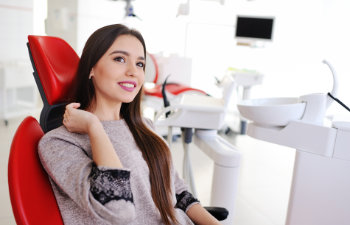
Removing a permanent tooth is not ideal, but it may be necessary. At Buford Family Dental, we perform dental extractions with remarkable precision and care. While we are confident we can retain your comfort while you are here at our office, there are also some things you can do at home to foster a better recovery and faster healing. Although very common, tooth extractions are considered minor oral surgery, which means you will be sent home with specific post-operative instructions by our Buford dentist.
Reasons to Remove a Tooth
While the goal is typically to preserve permanent teeth, there are situations where the removal of a permanent tooth may be necessary. Here are some reasons why a permanent tooth may need to be extracted:
- Severe tooth decay: Advanced tooth decay that has extensively damaged the tooth structure and cannot be effectively treated with a dental filling, crown, or root canal therapy may necessitate extraction.
- Periodontal (gum) disease: In cases of severe periodontal disease where the supporting structures of the tooth, such as the gums and bone, are significantly compromised, extraction may be required to prevent the spread of infection and preserve overall oral health.
- Tooth infection or abscess: If a bacterial infection reaches the inner pulp of the tooth, it can cause a painful abscess. In situations where the infection cannot be adequately controlled with root canal treatment or antibiotics, extraction may be the recommended course of action.
- Impacted wisdom teeth: Wisdom teeth, also known as third molars, often lack sufficient space to erupt properly and become impacted. Impacted wisdom teeth can lead to various issues, including pain, infection, crowding, and damage to adjacent teeth. In such cases, extraction is commonly performed.
- Dental trauma: Trauma resulting from accidents, sports injuries, or other impacts can fracture or dislocate a tooth. If the damage is severe and compromises the tooth’s integrity or causes nerve damage, extraction may be necessary.
- Severe crowding: In cases of severe dental crowding or malocclusion, where the teeth cannot be properly aligned with orthodontic treatment, extraction of one or more permanent teeth may be required to create space and achieve a balanced bite.
- Orthodontic treatment: As part of orthodontic treatment, teeth may need to be extracted to address severe overcrowding or correct significant bite problems. Extraction can create space for the remaining teeth to be properly aligned.
- Tooth development abnormalities: Some developmental abnormalities, such as severely malformed or misshapen teeth, may necessitate extraction if they cannot be effectively treated or restored.
Post-Operative Instructions After Tooth Removal
After a tooth extraction at Buford Family Dental, it’s important to follow our advice and post-operative instructions for optimal healing. Here are some general guidelines on what to avoid after a tooth extraction:
Eating and Drinking
Avoid consuming hot liquids and eating solid foods immediately after the extraction. Stick to cool or lukewarm liquids and consume soft foods that require minimal chewing. Avoid using a straw, as the suction can dislodge the blood clot and delay healing.
Spitting and Rinsing
Avoid spitting forcefully or rinsing your mouth vigorously for the first 24 hours after the extraction. This can disrupt the blood clot formation and lead to complications such as dry socket. Instead, follow our instructions on when and how to rinse your mouth gently with saltwater or a prescribed mouthwash.
Smoking and Tobacco Use
It’s crucial to avoid smoking or using any tobacco products after a tooth extraction. Smoking can impair healing, increase the risk of infection, and delay the formation of a blood clot.
Strenuous Activities
Engaging in strenuous activities or exercise can increase blood pressure and disrupt the healing process. It’s advisable to avoid vigorous exercise, heavy lifting, or activities that may put excessive strain on the mouth for at least a few days after the extraction.
Touching the Extraction Site
Refrain from touching the extraction site with your fingers, tongue, or any objects. This can introduce bacteria and increase the risk of infection.
Alcohol Consumption
Avoid consuming alcoholic beverages for at least 24 hours after the extraction. Alcohol can interfere with the blood clotting process and delay healing.
Medications and Mouth Rinses
Follow Buford Family Dental’s instructions regarding prescribed medications, including painkillers or antibiotics. Avoid using over-the-counter mouth rinses unless specifically recommended by one of our dentists.
Oral Hygiene
Practice gentle oral hygiene during the healing process. Brush your teeth carefully, avoiding the extraction site, and use a soft-bristled toothbrush. Be cautious when flossing near the extraction site, and follow your dentist’s instructions on when to resume regular brushing and flossing.
Proper post-extraction care promotes healing, reduces the risk of complications, and facilitates a smooth recovery. At Buford Family Dental, we want our patients to have a positive and stress-free experience when it comes to tooth removal. Please call our office to learn more about this procedure as well as our tooth replacement options if necessary.
Posted on behalf of
4536 Nelson Brogdon Blvd., Building A
Buford, GA 30518
Phone: Call 678-730-2005
Email: staff@bufordfamilydental.com
